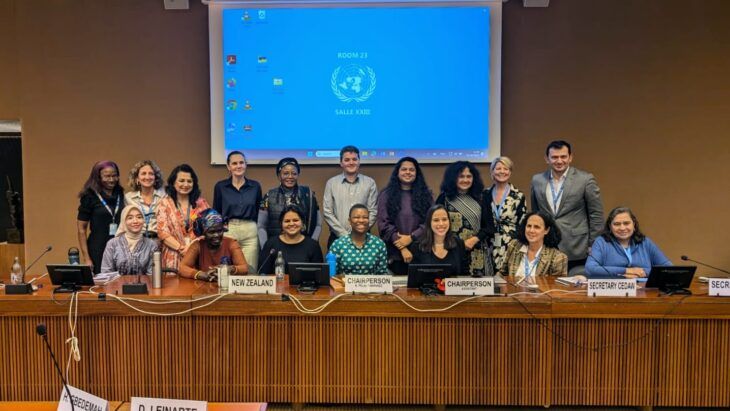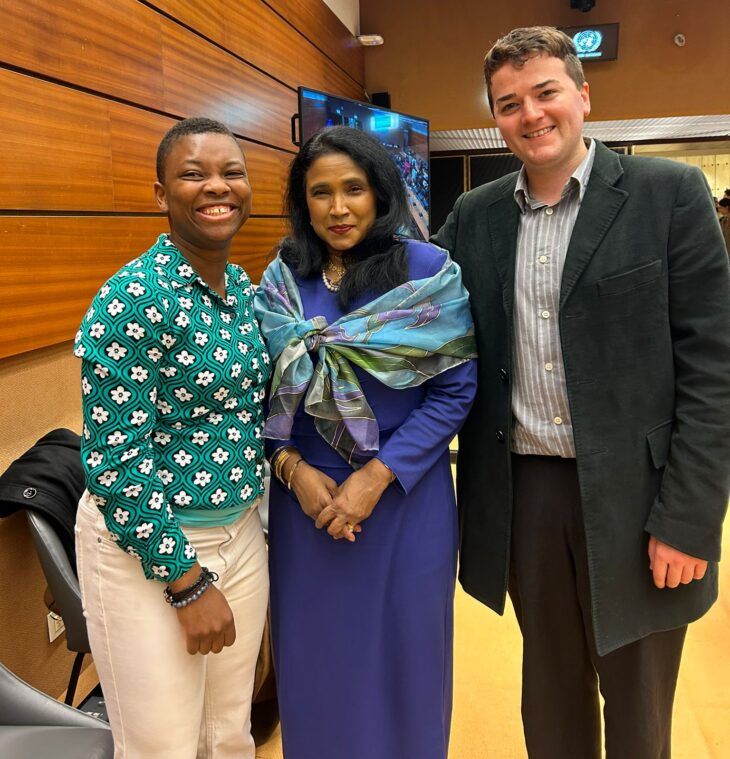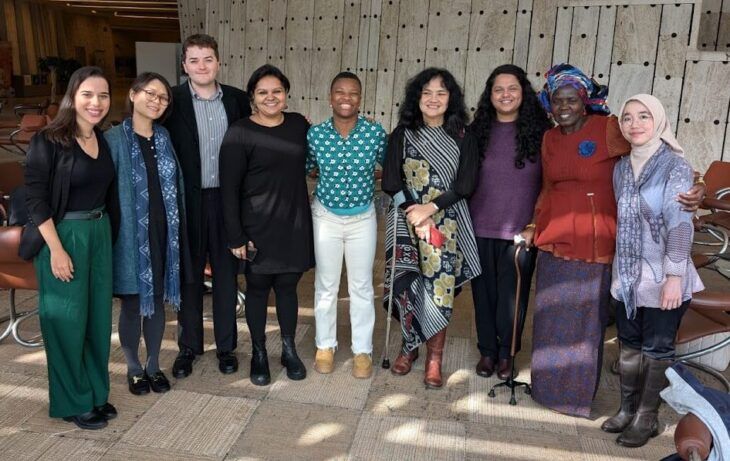Blog
Inclusion Ireland’s Lydia Fisher Speaks at the United Nations
- Inclusive participation & citizenship
- Ending discrimination
In October, Lydia Fisher, a self-advocate from Inclusion Ireland and Inclusion International, spoke on a global stage at the United Nations.
Lydia participated in a side session to the UN Committee on the Elimination of Discrimination against Women (CEDAW) meetings organised by Women Enabled International about the stereotypes that women with intellectual disabilities and women with psychosocial disabilities face.
Women Enabled International and Inclusion International are working together on a project about the rights of women with intellectual disabilities to make decisions on their sexual and reproductive health.

Speaking to the UN Committee on the Elimination of Discrimination against Women (CEDAW) in Geneva, Lydia highlighted the stereotypes faced by women with intellectual disabilities, especially in decision-making, relationships, and sexuality.
CEDAW is a group of 23 experts from around the world who check on the work countries are doing to make the UN Convention on the Elimination of All Forms of Discrimination against Women a reality.
Sharing Her Story
We spoke with Lydia about her experience. She told us she opened her presentation by sharing her personal journey.
“I talked about my life as a woman with an intellectual disability, and about topics like legal capacity, and relationships and sexuality rights for women with intellectual disabilities,” Lydia said.
I was invited to speak up for women with intellectual disabilities to show that we deserve the same rights as any other women.
Lydia Fisher, Self-Advocate, Inclusion Ireland
“I think it was powerful because they invited us, women with disabilities, to tell our stories and tell them about the stereotypes we face,” Lydia explained.

Recommendations for change
Lydia’s speech combined her experiences with recommendations she and other women with intellectual disabilities call for:
- Legal capacity laws need to be changed in countries where they take away people’s rights to make decisions about their lives.
- All women should be supported to make their own decisions, regardless of how they communicate or others’ opinions.
- Women with intellectual disabilities have the right to relationships, families and marriages. We need better rights-based education programmes on sex and relationships in every country.
- All institutions, big or small, must close. All women should be supported to live in and contribute to our communities.
- Sterilisation needs to be stopped immediately. We need to have control over our own bodies and make our own medical decisions.
- All work that is about women with intellectual disabilities must include us and our organisations from the start. We are the experts.
- Governments must make sure that women with intellectual disabilities can take part in politics, including voting and running for office. Political systems and parties need to be accessible.
Lydia shared examples of women overcoming barriers, such as Ana Victoria Espino, the first lawyer with Down Syndrome in Mexico, and María del Mar Galcerán, Spain’s first politician in parliament with Down Syndrome.
“I think they are amazing examples because they show everyone that we can all do the same things if we get the help and support we need.”

Reflecting on the experience
Reflecting on her experience, Lydia said it felt powerful to stand up for others after a lifetime of wanting to. “When I was young I was afraid to speak up. Now I know that I have a choice, and I can say no when I want, and now I can help other people to be brave to say no and to stand up for themselves.”
Lydia said that she felt well supported to take part. She shared, “The meeting was good, I think everyone was listening. Inclusion International and Women Enabled International shared information about how to make meetings accessible for people with intellectual disabilities with everyone before the meeting.”
However, Lydia thinks that UN Committees need to better understand accommodations needed by people with intellectual disabilities.
“I would hope that if they asked people with intellectual disabilities to speak to them again, they would give them more time. It’s very important to listen to us and for us to be able to talk in the way we can. Sometimes, people with intellectual disabilities might speak a bit slower or take more time to read. If you have so little time you might get nervous and misspeak things.”
Lydia was inspired by meeting other women leaders, including the speakers with psychosocial disabilities Yeni from Indonesia and Robinah from Uganda.
Lydia said, “I didn’t know that there were so many women in these countries who were going through forced sterilisation and institutionalisation. These are women who just want what other women can have, to be a mother and to live in their own house.”
Lydia was invited to meet Ana Peláez Narváez after the session. Ana is the chairperson of CEDAW and also has a disability, Lydia said “She understands how important it is for the committee to listen to people who have lived experience so they can do their work better”.
We can do anything we want when we have the right people behind us.
Lydia Fisher, Self-Advocate, Inclusion Ireland
However, Lydia told us there is still work to be done. “Even though there were loads of people in the room who were supporting my message, there was still someone who didn’t understand what I was saying and disagreed about women with intellectual disabilities having a marriage and making a family of their own. That just shows we can go anywhere, and some people might not like what we say.”
Looking Ahead
For Lydia, this is just the beginning. “I realised we can do anything we want when we have the right people behind us. I want to keep speaking up.”
Her message to other self-advocates is clear: “Go for it! You need to be heard. Don’t be shy and keep going. Sometimes people may hear you, and sometimes people may not hear you, but if you know you went for it, that’s what matters.”
Sometimes people may hear you, and sometimes they may not, but if you know you went for it, that’s what matters.
Lydia Fisher, Self-Advocate, Inclusion Ireland
Women Enabled International, Inclusion International, and Inclusion Ireland supported Lydia in her journey, but her message is a call for more representation.
Women with intellectual disabilities must be included in women’s rights discussions. Their voices matter.
To learn more about Lydia’s story and Inclusion Ireland’s work, visit their website and follow them on social media.
You can download Lydia’s presentation to the committee here.